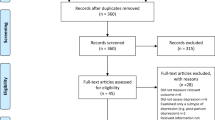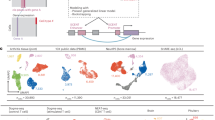Abstract
We introduce multi-trait analysis of GWAS (MTAG), a method for joint analysis of summary statistics from genome-wide association studies (GWAS) of different traits, possibly from overlapping samples. We apply MTAG to summary statistics for depressive symptoms (Neff = 354,862), neuroticism (N = 168,105), and subjective well-being (N = 388,538). As compared to the 32, 9, and 13 genome-wide significant loci identified in the single-trait GWAS (most of which are themselves novel), MTAG increases the number of associated loci to 64, 37, and 49, respectively. Moreover, association statistics from MTAG yield more informative bioinformatics analyses and increase the variance explained by polygenic scores by approximately 25%, matching theoretical expectations.
This is a preview of subscription content, access via your institution
Access options
Access Nature and 54 other Nature Portfolio journals
Get Nature+, our best-value online-access subscription
$29.99 / 30 days
cancel any time
Subscribe to this journal
Receive 12 print issues and online access
$209.00 per year
only $17.42 per issue
Buy this article
- Purchase on Springer Link
- Instant access to full article PDF
Prices may be subject to local taxes which are calculated during checkout







Similar content being viewed by others
Change history
25 June 2019
In the version of the paper initially published, no competing interests were declared. The ‘Competing interests’ statement should have stated that B.M.N. is on the Scientific Advisory Board of Deep Genomics. The error has been corrected in the HTML and PDF versions of the article.
30 May 2019
An amendment to this paper has been published and can be accessed via a link at the top of the paper.
References
Galesloot, T. E., van Steen, K., Kiemeney, L. A., Janss, L. L. & Vermeulen, S. H. A comparison of multivariate genome-wide association methods. PLoS One 9, e95923 (2014).
Porter, H. F. & O’Reilly, P. F. Multivariate simulation framework reveals performance of multi-trait GWAS methods. Sci. Rep. 7, 38837 (2017).
Maier, R. et al. Joint analysis of psychiatric disorders increases accuracy of risk prediction for schizophrenia, bipolar disorder, and major depressive disorder. Am. J. Hum. Genet. 96, 283–294 (2015).
Hu, Y. et al. Joint modeling of genetically correlated diseases and functional annotations increases accuracy of polygenic risk prediction. PLoS Genet. 13, e1006836 (2017).
Baselmans, B.M.L. et al. Multivariate genome-wide and integrated transcriptome and epigenome-wide analyses of the well-being spectrum. Preprint at bioRxiv https://doi.org/10.1101/115915 (2017).
Bulik-Sullivan, B. et al. An atlas of genetic correlations across human diseases and traits. Nat. Genet. 47, 1236–1241 (2015).
Hyde, C. L. et al. Identification of 15 genetic loci associated with risk of major depression in individuals of European descent. Nat. Genet. 48, 1031–1036 (2016).
Ripke, S. et al. A mega-analysis of genome-wide association studies for major depressive disorder. Mol. Psychiatry 18, 497–511 (2013).
de Moor, M. H. M. et al. Meta-analysis of genome-wide association studies for neuroticism, and the polygenic association with major depressive disorder. JAMA Psychiatry 72, 642–650 (2015).
Smith, D. J. et al. Genome-wide analysis of over 106 000 individuals identifies 9 neuroticism-associated loci. Mol. Psychiatry 21, 749–757 (2016).
Okbay, A. et al. Genetic variants associated with subjective well-being, depressive symptoms, and neuroticism identified through genome-wide analyses. Nat. Genet. 48, 624–633 (2016).
Bolormaa, S. et al. A multi-trait, meta-analysis for detecting pleiotropic polymorphisms for stature, fatness and reproduction in beef cattle. PLoS Genet. 10, e1004198 (2014).
Zhu, X. et al. Meta-analysis of correlated traits via summary statistics from GWASs with an application in hypertension. Am. J. Hum. Genet. 96, 21–36 (2015).
Bulik-Sullivan, B. K. et al. LD Score regression distinguishes confounding from polygenicity in genome-wide association studies. Nat. Genet. 47, 291–295 (2015).
Pers, T. H. et al. Biological interpretation of genome-wide association studies using predicted gene functions. Nat. Commun. 6, 5890 (2015).
Frey, B. J. & Dueck, D. Clustering by passing messages between data points. Science 315, 972–976 (2007).
Südhof, T. C. The presynaptic active zone. Neuron 75, 11–25 (2012).
Pin, J.-P. & Bettler, B. Organization and functions of mGlu and GABAB receptor complexes. Nature 540, 60–68 (2016).
Traynelis, S. F. et al. Glutamate receptor ion channels: structure, regulation, and function. Pharmacol. Rev. 62, 405–496 (2010).
Zheng, J. et al. LD Hub: a centralized database and web interface to perform LD score regression that maximizes the potential of summary level GWAS data for SNP heritability and genetic correlation analysis. Bioinformatics 33, 272–279 (2017).
Yang, J., Lee, S. H., Goddard, M. E. & Visscher, P. M. GCTA: a tool for genome-wide complex trait analysis. Am. J. Hum. Genet. 88, 76–82 (2011).
Vilhjálmsson, B. J. et al. Modeling linkage disequilibrium increases accuracy of polygenic risk scores. Am. J. Hum. Genet. 97, 576–592 (2015).
Yang, J. et al. Genomic inflation factors under polygenic inheritance. Eur. J. Hum. Genet. 19, 807–812 (2011).
Wientjes, Y. C. J., Bijma, P., Veerkamp, R. F. & Calus, M. P. L. An equation to predict the accuracy of genomic values by combining data from multiple traits, populations, or environments. Genetics 202, 799–823 (2016).
Lee, S.H., Clark, S. & van der Werf, J. Estimation of genomic prediction accuracy from reference populations with varying degrees of relationship. Preprint at bioRxiv https://doi.org/10.1101/119164 (2017).
Lee, S. H., Weerasinghe, W. M. S. P., Wray, N. R., Goddard, M. E. & van der Werf, J. H. J. Using information of relatives in genomic prediction to apply effective stratified medicine. Sci. Rep. 7, 42091 (2017).
Sonnega, A. et al. Cohort profile: the Health and Retirement Study (HRS). Int. J. Epidemiol. 43, 576–585 (2014).
Daetwyler, H. D., Villanueva, B. & Woolliams, J. A. Accuracy of predicting the genetic risk of disease using a genome-wide approach. PLoS One 3, e3395 (2008).
Wray, N. R. et al. Pitfalls of predicting complex traits from SNPs. Nat. Rev. Genet. 14, 507–515 (2013).
Pasaniuc, B. & Price, A. L. Dissecting the genetics of complex traits using summary association statistics. Nat. Rev. Genet. 18,117–127 (2017).
Acknowledgements
We thank J. Beauchamp, P. Koellinger, Ö. Sandewall, C. Shulman, and R. de Vlaming for helpful comments and P. Bowers, E. Kong, T. Kundu, S. Lee, H. Li, R. Li, and R. Royer for research assistance. This research was carried out under the auspices of the Social Science Genetic Association Consortium (SSGAC). The study was supported by the Ragnar Söderberg Foundation (E9/11, M.J.; E42/15, D.C.), the Swedish Research Council (421-2013-1061, M.J.), the Jan Wallander and Tom Hedelius Foundation (M.J.), an ERC Consolidator Grant (647648 EdGe, P. Koellinger), the Pershing Square Fund of the Foundations of Human Behavior (D.L.), the National Science Foundation’s Graduate Research Fellowship Program (DGE 1144083, R.W.), and the NIA/NIH through grants P01-AG005842, P01-AG005842-20S2, and T32-AG000186-23 to D. Wise at NBER; P30-AG012810 (D.L.) to NBER; R01-AG042568-02 (D.J.B.) to the University of Southern California; and 1R01-MH107649-03 (B.M.N.), 1R01-MH101244-02 (B.M.N.), and 5U01-MH109539-02 (B.M.N.) to the Broad Institute at Harvard and MIT. This research has also been conducted using the UK Biobank Resource under application number 11425. We thank the research participants and employees of 23andMe for making this work possible. We also thank K. Mullan Harris and Add Health for early access to the data used in our replication and prediction analyses. A full list of acknowledgements is provided in the Supplementary Note.
Author information
Authors and Affiliations
Consortia
Contributions
B.M.N., D.J.B., D.C., and P.T. oversaw the study. The theory underlying MTAG was conceived of and developed by P.T., with contributions from B.M.N., D.J.B., D.C., D.L., O.M., P.M.V., and R.K.W. O.M., P.T., and R.K.W. performed the simulations and developed the MTAG software. P.T. and P.M.V. designed the analyses comparing the observed MTAG gains to theoretical expectations. A.O., M.Z., R.W., M.A.F., O.M., and T.A.N.-V. had major roles in data analyses. J.J.L. designed and executed the bioinformatics analyses. N.A.F. conducted the analysis of the data from 23andMe. D.J.B., D.C., and P.T. coordinated the writing of the manuscript. P.M., S.O., and M.J. also contributed to the writing. All authors provided input and revisions for the final manuscript.
Corresponding authors
Ethics declarations
Competing interests
B.M.N. is on the Scientific Advisory Board of Deep Genomics.
Additional information
Publisher’s note: Springer Nature remains neutral with regard to jurisdictional claims in published maps and institutional affiliations.
23andMe Research Team:
Michelle Agee12, Babak Alipanahi12, Adam Auton12, Robert K. Bell12, Katarzyna Bryc12, Sarah L. Elson12, Pierre Fontanillas12, Nicholas A. Furlotte12, David A. Hinds12, Bethann S. Hromatka12, Karen E. Huber12, Aaron Kleinman12, Nadia K. Litterman12, Matthew H. McIntyre12, Joanna L. Mountain12, Carrie A. M. Northover12, J. Fah Sathirapongsasuti12, Olga V. Sazonova12, Janie F. Shelton12, Suyash Shringarpure12, Chao Tian12, Joyce Y. Tung12, Vladimir Vacic12, Catherine H. Wilson12 and Steven J. Pitts12
Supplementary information
Supplementary Text and Figures
Supplementary Figures 1–13, Supplementary Tables 4, 6–8, 10–13, 15–18, 30 and 31, and Supplementary Note.
Supplementary Tables
Supplementary Tables 1–3, 5, 9, 14 and 19–29.
Rights and permissions
About this article
Cite this article
Turley, P., Walters, R.K., Maghzian, O. et al. Multi-trait analysis of genome-wide association summary statistics using MTAG. Nat Genet 50, 229–237 (2018). https://doi.org/10.1038/s41588-017-0009-4
Received:
Accepted:
Published:
Issue Date:
DOI: https://doi.org/10.1038/s41588-017-0009-4
This article is cited by
-
A linear weighted combination of polygenic scores for a broad range of traits improves prediction of coronary heart disease
European Journal of Human Genetics (2024)
-
Pleiotropy and genetically inferred causality linking multisite chronic pain to substance use disorders
Molecular Psychiatry (2024)
-
Integration of risk factor polygenic risk score with disease polygenic risk score for disease prediction
Communications Biology (2024)
-
Proteome-wide Mendelian randomization highlights AIF1 and HLA-DQA2 as targets for primary sclerosing cholangitis
Hepatology International (2024)
-
Causality between COVID-19 and multiple myeloma: a two-sample Mendelian randomization study and Bayesian co-localization
Clinical and Experimental Medicine (2024)



